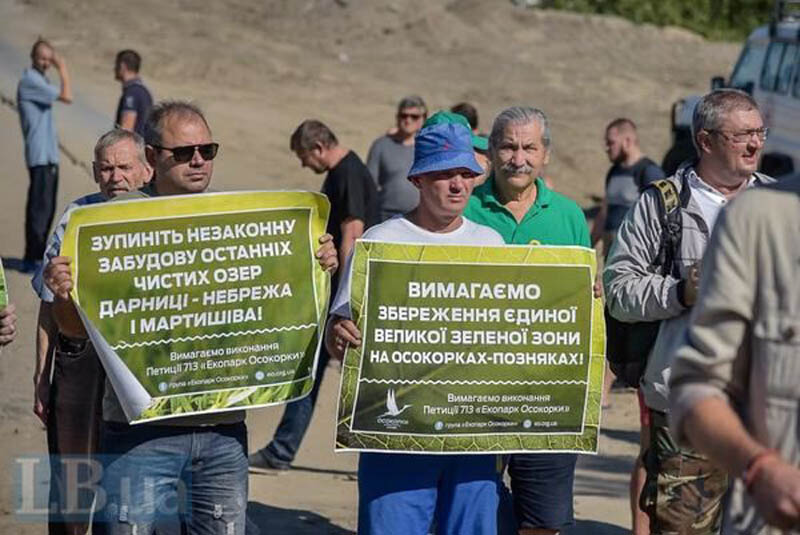Борьба общества против застройщиков которые уничтожают эко-парк на Осокорках


Как активисты борются за сохранение экопарка «Осокорки» и что известно о недавнем пожаре на его территории
Экопарк «Осокорки» — это природная территория на левобережье Киева, расположенная вблизи плотно застроенных жилых массивов Осокорки, Позняки и Харьковский.
В составе экопарка озера Небреж, Мартышев и Тягле, а также каналы и рощи вокруг них, цветущие пойменные луга и остатки ландшафтных комплексов левобережной поймы реки Днепр, которые в почти первозданном состоянии в пределах Киева сохранились только на Осокорках. Эта местность является уникальным природным домом для многих представителей флоры и фауны, некоторые из которых занесены в Красную книгу Украины.
В течение почти десяти лет местные жители, объединенные сначала в инициативную группу, а затем и в общественную организацию «Экопарк Осокорки», борются за сохранение этого природного парка и выступают против его застройки. За это время состоялось несколько попыток застроить парк, судебные тяжбы, чтобы признать строительство незаконным, давление и угрозы активистам, а также недавний пожар на нескольких участках пойменных лугов.

С чего все началось
Борьба за свободные от застройки озера на южных Осокорках началась еще в 2005-2006 годах, когда местные жители снесли первый забор, которым застройщик отгородил доступ к озеру Небреж. Закрытие прохода к озеру вызвало тогда значительное возмущение со стороны местной общины. Забор сломали и сожгли, а застройщик отступил.
«Для начала стоит сказать, что земля, которая была передана застройщику для строительства жилых комплексов, не должна была переходить в аренду. Однако это все же произошло в 2005 году с разрешения тогдашнего мэра Киева Александра Омельченко с вопиющим нарушением процедуры. И когда мы обращаем на это внимание, то все говорят, что тогда были такие времена. Омельченко единолично подписал приказ о создании и подготовке проекта землеустройства без согласования с Киевсоветом. Впоследствии прошли сроки давности, и это решение уже нельзя было обжаловать», — вспоминает соучредитель и руководитель ОО «Экопарк Осокорки» Александр Пилипенко.
В 2008 году начался мировой финансовый кризис, который обвалил рынок недвижимости, в результате чего застройку южных Осокорков отложили на неопределенный срок. Однако застройщик продолжал готовить почву для будущего масштабного строительства.
А уже в 2009 году, когда городом руководил Михаил Черновецкий и его «молодая команда», в три часа ночи, по словам активиста, просто с голоса приняли скандальный «Детальный план территории района Осокорки», который полностью противоречил действующему Генеральному плану города и позволял жилую застройку всей природоохранной территории вокруг озера Небреж, где согласно Генплану предусмотрено обустройство большого рекреационного гидропаркового комплекса.
В 2015 году, как только в Киеве заработал сервис электронных петиций Киевсовета, одной из первых была подана электронная петиция №713 «Ландшафтный природный парк вместо застройки южных Осокорков» с требованием остановить строительство на озерах южных Осокорков и создать в этой местности большой региональный ландшафтный экопарк — «Осокорки». Петиция в рекордно быстрый срок набрала более 11 тысяч голосов горожан.
«Петиция стала для нас одним из первых инструментов влияния на местное самоуправление. После того, как она быстро набрала голоса, уже весной 2016 года мы собрали нашу первую команду организации. Было ожидание, что если петиция стала успешной, голоса собраны, то дальше раз-два — и будет у нас парк. Как оказалось, все гораздо сложнее. Продолжались комиссии, консультации, обсуждения, к нам понемногу присоединялись новые люди. Но осенью 2017 года застройщик, тогда это была «Аркада», начал работы на берегу озера Небреж. И стало понятно, что здесь одной петиции мало, надо подключать борьбу в юридической плоскости», — рассказывает Александр Пилипенко.
В 2017 году активисты инициативной группы создали общественную организацию «Экопарк Осокорки». Тогда юристы организации собрали документы и подали ходатайство в прокуратуру города Киева с требованием остановить незаконную застройку более 300 гектаров озер и лугов в пределах южных Осокорков.
Параллельно организация начала процесс подтверждения того, что экопарк является природоохранным памятником и поэтому его нельзя застраивать.
На территории экопарка — более 160 видов редких птиц. В частности, это усатая синица, рыбалочка, синешейка, щиглик, кулик-сорока, змееяд, пастушья сумка, орлан-белохвост и другие. А также растут такие растения как гвоздика борбаша, колокольчик малый, дрок красильный, желтый осот полевой, клевер альпийский, девясил британский и др. Они и создают маленький природный оазис посреди городской застройки на левобережье Киева.
«Экопарк состоит фактически из набора земельных участков, часть которых в аренде у компании «Контакт-Будсервис», и которые ранее принадлежали банку «Аркада», а сейчас застройщику «Столица групп». Эта территория — большой прямоугольник площадью 176 гектаров. Он охватывает озера Небреж, Тягле и их прибрежные полосы. Еще один большой участок, который входит в парк, — ландшафтный заказник местного значения «Осокорковские луга». Все эти участки имеют природоохранный статус, однако значительная часть территории экопарка, причем с очень ценными рекреационными природоохранными и экологическими зонами, остается в аренде у застройщика. Поэтому угроза застройки никуда не исчезла. И застройщик от своих планов не отказался», — говорит Александр Пилипенко.
По словам активиста, застройщик планирует возвести более 40 многоэтажек, которые полностью изменят ландшафт территории.
«За песками начинается полноценный лес, а за ним пойменные луга. Если там будет строительство, то вся территория лесов должна быть вырублена и намыта на тот же уровень песков до уровня остального района. И отмечу, что эта территория — зона паводкового подтопления и поэтому застройка здесь невозможна. Но, если застройщик все же будет воплощать этот проект, ему придется согласно строительной документации повысить уровень территории на 6-8 метров», — объясняет Александр Пилипенко.
В 2018 году активисты начали судебный процесс по обжалованию разрешения на строительство жилого комплекса. В первой инстанции они проиграли, однако в апелляции выиграли, и строительство удалось на время остановить. А уже в кассации — это решение отправили обратно в тогдашний одиозный Окружной административный суд Киева. После его ликвидации дело перешло в Высший административный суд Киева, однако более чем за два с половиной года очередь до дела не дошла.
«Наше дело подвисло. Но скажу, что, кроме отмены разрешений на строительство возле озер, мы еще и требуем признания противоправным и отмены решения Киевского городского совета об утверждении Детального плана территории района Осокорки», — говорит активист.
О давлении на активистов и запугивании «титушками»
По словам Александра Пилипенко, борьбу против застройки экопарка стоит разделить на два периода: когда там был бывший застройщик «Аркада» и нынешний «Столица групп».
«Во времена «Аркады», когда в 2018 году были активные столкновения на песках между активистами и теми, кто якобы представлял застройщика, мы имели угрозы от так называемых титушек. Это были 2018-2019 годы», — рассказывает активист.
В сети можно найти новости за июль 2018 года, в которых говорится о столкновении между активистами с одной стороны и неизвестными вооруженными людьми в масках и полицией с другой. Тогда полиция начала разгонять протестующих и в столкновениях использовала газовые баллончики. Были задержаны двое активистов.
В конце сентября активисты снова вышли на протест перед стройплощадкой и пытались снести забор вокруг строительства. Тем временем за забором их ждали «охранники» спортивной внешности и в масках. Когда подошла полиция, то так называемые титушки начали бросать в них петарды. Тогда правоохранители задержали ориентировочно 40 молодых людей и изъяли ящики с зажигательной смесью, пиротехнику, холодное и огнестрельное оружие.
В ноябре того же 2018 года домой к Александру Пилипенко пришла налоговая полиция и, по словам активиста, провела обыск с грубыми нарушениями и угрожала забрать машину. Налоговики обвиняли Александра в неуплате налогов. Эти следственные действия он связывал с борьбой его организации против застройки озер.
В 2019 году активных суточек не было, и борьба перешла в судебные залы.
«Потом «Аркада» накрылась и пришел новый застройщик — «Столица групп». И я бы не сказал, что после этого против нас были какие-то угрозы», — отметил Александр Пилипенко.
Пожар в экопарке «Осокорки»
5 марта этого года произошел пожар на нескольких участках экопарка. Горели влажные луга и камышовые плавни. Активисты убеждены, что пожар возник в результате поджога. Ведь, по их мнению, учитывая погоду и разные места возгорания, это не могло быть самовозгоранием.
«Относительно того, кто поджег экопарк, мы никого за руку не поймали. Поэтому все это может быть только догадками. Выгоден ли этот пожар застройщику? Да, выгоден. Возгорание было на его участках? Да, на двух его участках. Без квадрокоптера невозможно оценить масштаб трагедии, потому что территория залита водой», — говорит активист.
По его мнению, растительность на тех участках более-менее быстро восстановится, однако с точки зрения среды обитания для водоплавающих птиц и всех других живых существ, которые там жили, местность в значительной степени уничтожена.
«Мы на следующий день после пожара были в полиции, написали с еще двумя активистами заявления, и правоохранители взялись расследовать поджог, потому что других вариантов там не может быть», — добавил Александр Пилипенко.
Как написала на своей странице в фейсбуке депутат Киевсовета Ксения Семенова, огонь бушевал сразу на двух объектах природно-заповедного фонда Киева — в ландшафтных заказниках местного значения «Озеро Тягле» и «Осокорковские луга».
Компания «Столица групп» обнародовала на своем сайте заявление о том, что она неприятно поражена произошедшим и предложила спасателям помощь. В компании также призвали СМИ «не становиться участниками целенаправленной информационной атаки» на строительную компанию, которую якобы «развернули отдельные физические лица и организации».
«Stolitsa Group оставляет за собой право отстаивать свою деловую репутацию в судебном порядке. Отдельно просим правоохранителей выяснить мотивы «источников», которые распространяют манипулятивные и лживые заявления в адрес нашей компании», — говорилось в сообщении.
В то же время полиция Киева расследует пожар в экопарке как умышленный поджог, ведь уголовное производство начали по части 2 статьи 252 УКУ («Умышленное уничтожение или повреждение территорий, взятых под охрану государства, и объектов природно-заповедного фонда»).
Через несколько дней после пожара активисты организации совместно с департаментом защиты окружающей среды и адаптации к изменениям климата КГГА, «Киевзеленстроем», Управлением зеленых насаждений Дарницкого района, представителем ботсада Гришко и другими должностными лицами приехали на места горения.
«Ключевым нашим вопросом было: что мы можем сделать, чтобы минимизировать последствия пожара. По правде говоря, как бы это ни звучало, особо делать ничего не нужно — стоит дать природе немного покоя. Главная помощь от природы — это дождливая погода», — говорит Александр Пилипенко.
Однако также активистам удалось поднять и другие важные для организации вопросы. В частности, это вынесение в натуру границ заказников «Осокорковские луга» и «Озеро Тягле», потому что сейчас это участки территории, которых нет на кадастровой карте и поэтому нельзя сказать, где заказники начинаются, а где заканчиваются; а также вопрос ликвидации стихийных свалок на прилегающих территориях экопарка со стороны улицы Коллекторной и Ревуцкого.
Recent Posts
Сбежавший в Швейцарию блогер Станислав Домбровский просит прощения у украинцев
Одесский трэш блогер Стас Домбровский, который в последнее время проживает в Швейцарии, записал видеообращение к…
Александра Устинова и атака на руководство АОЗ: что стоит за волной критики
Александра Устинова, народная депутат, которая в последние дни активно атакует Агентство оборонных закупок (АОЗ) возможно…
Журналисты показали имение киевской судьи, закрывшей дело Приходько
Свобода "под ключ" или манипуляция правосудием? Борис Приходько – нацбанкир времен Януковича и действующий нардеп…
Судьи вне закона
В течение последних трех лет внимание общественности если и бывает приковано к судам, то гораздо…
Артем Ляшанов и bill_line спасают репутацию через суд
Финтех-компания столкнулась с обвинениями в отмывании денег игорной мафии. ООО «Тех-Софт Атлас» (ТМ «bill_line») и…
Криптобиржа WhiteBIT: как Владимир Носов и «регионалы» Шенцевы отмывают деньги и помогают спецслужбам России
Владимир Носов в Украине пытается позиционировать себя как респектабельный бизнесмен и хозяин криптобиржи WhiteBIT. Однако…


